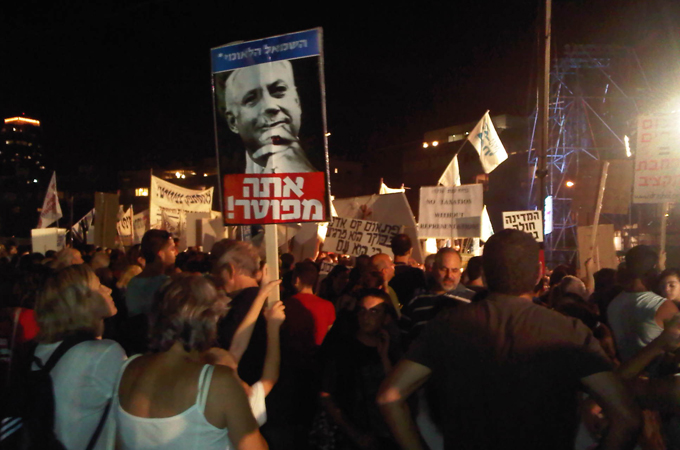Israelis hold ‘march of a million’ protest
Demonstrations held in major cities across Israel, as organisers say half-million people march in the streets.

 |
| “An entire generation wants a future”, read one banner as demonstrators flooded the streets |
Eight weeks after Israel’s largest social protest began, the movement has held a “march of a million protest” that aimed to bring one million Israelis across the country into the streets.
The grassroots movement has swollen since July from a cluster of student tent-squatters protesting against rising housing costs into a countrywide mobilisation of Israel’s middle class.
“Tonight society will divide into an old type of Israeli who just accepts the way things are and a new type who will join us in pushing for change,” Itzik Shmuli, head of the National Student Union and one of the protest’s leaders, said on Saturday.
With the school year resuming and a Palestinian statehood bid around the corner, analysts predicted the outpouring will soon cool significantly, adding pressure on the protesters to produce an impressive turnout.
However, 500,000 protesters are out on the streets across the country, organisers have reported, making the gathering the largest in the country’s history.
Nationwide marches
Up to 50,000 protesters gathered at Paris Square in west Jerusalem near the Israeli Prime Minister Binyamin Netanyahu’s residence, according to the Israeli police estimates.
Over 40,000 people were protesting in Haifa and thousands of others in various pockets across the country, numbers ranging from 1,000 to 12,000.
Al Jazeera’s Cal Perry, reporting from Israel, said, “There have been hundreds of police officers deployed here in Tel Aviv, and almost half the streets have been shut down. Police are searching people as they enter this central square.”
The participants are not only protesting over the high cost of living, but also of education, health care and food.
“I’ve had enough of always working and never advancing. You have to work several jobs just to survive,” Sharon Riwkes, a 30-year-old clinical psychology resident in Tel Aviv, said. “All the burden is on the middle class.”
“An entire generation wants a future,” read one banner as demonstrators flooded the streets of Tel Aviv, Haifa and Jerusalem, shouting “the people demand social justice”.
Netanyahu, who set up a committee exploring a broad revamp of economic policies, has warned he will not be able to satisfy all of the protesters’ demands.
“There has been very little dialogue and very little movement [from the committee], and the sense among some of the organisers is that the government can just sit this one out,” our correspondent said.
‘Bibi, go home’
Crowds in Tel Aviv chanted, “Get off your balconies, the country is collapsing” and “Bibi, Bibi, go home”, referring to their demand that Binyamin Netanyahu leave office.
“There is a chance here to change the face of Israel,” Tzipi Livni, the parliamentary opposition leader, told Israel’s Channel 2 TV on Saturday.
The prime minister’s governing coalition faces no immediate threat but the protests have emphasised the potential electoral impact of a middle class rallying under the banner of “social justice”.
The protest movement has been reluctant to discuss Israel’s occuption of the Palestinian peoples, but some demonstrators in Tel Aviv were seen carrying signs with slogans, such as “social justice = leave the settlements”.
A brief flare-up between Israel and Palestinian fighters in Gaza deflected attention from the protests, but the large turnout Saturday indicated, at least for the weekend, that the focus has returned.
Israel emerged from the global financial crisis relatively unscathed; the economy is enjoying rapid growth and unemployment is at its lowest in decades at around 5.5 per cent.
Even so, statistics show the ranks of the working poor have grown dramatically, as wealth has increasingly become concentrated among a small group of tycoons.
The middle class has specifically been hit hard, with high taxes and salaries that have not kept pace with rising consumer prices.
In recent months, the country has experienced protests against the high price of gasoline and cottage cheese – a staple of the Israeli diet – and seen lengthy strikes by social workers and doctors over low pay and working conditions.